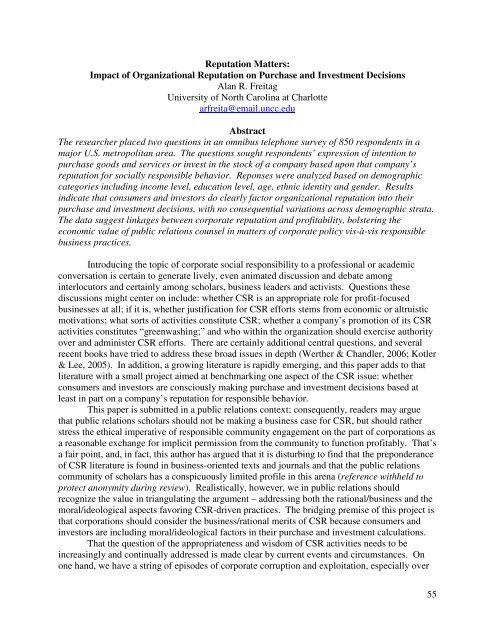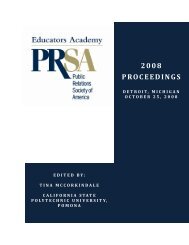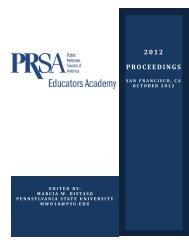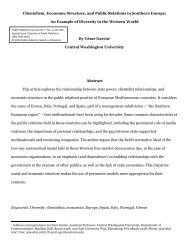2010 - Public Relations Society of America
2010 - Public Relations Society of America
2010 - Public Relations Society of America
Create successful ePaper yourself
Turn your PDF publications into a flip-book with our unique Google optimized e-Paper software.
Reputation Matters:<br />
Impact <strong>of</strong> Organizational Reputation on Purchase and Investment Decisions<br />
Alan R. Freitag<br />
University <strong>of</strong> North Carolina at Charlotte<br />
arfreita@email.uncc.edu<br />
Abstract<br />
The researcher placed two questions in an omnibus telephone survey <strong>of</strong> 850 respondents in a<br />
major U.S. metropolitan area. The questions sought respondents’ expression <strong>of</strong> intention to<br />
purchase goods and services or invest in the stock <strong>of</strong> a company based upon that company’s<br />
reputation for socially responsible behavior. Reponses were analyzed based on demographic<br />
categories including income level, education level, age, ethnic identity and gender. Results<br />
indicate that consumers and investors do clearly factor organizational reputation into their<br />
purchase and investment decisions, with no consequential variations across demographic strata.<br />
The data suggest linkages between corporate reputation and pr<strong>of</strong>itability, bolstering the<br />
economic value <strong>of</strong> public relations counsel in matters <strong>of</strong> corporate policy vis-à-vis responsible<br />
business practices.<br />
Introducing the topic <strong>of</strong> corporate social responsibility to a pr<strong>of</strong>essional or academic<br />
conversation is certain to generate lively, even animated discussion and debate among<br />
interlocutors and certainly among scholars, business leaders and activists. Questions these<br />
discussions might center on include: whether CSR is an appropriate role for pr<strong>of</strong>it-focused<br />
businesses at all; if it is, whether justification for CSR efforts stems from economic or altruistic<br />
motivations; what sorts <strong>of</strong> activities constitute CSR; whether a company’s promotion <strong>of</strong> its CSR<br />
activities constitutes “greenwashing;” and who within the organization should exercise authority<br />
over and administer CSR efforts. There are certainly additional central questions, and several<br />
recent books have tried to address these broad issues in depth (Werther & Chandler, 2006; Kotler<br />
& Lee, 2005). In addition, a growing literature is rapidly emerging, and this paper adds to that<br />
literature with a small project aimed at benchmarking one aspect <strong>of</strong> the CSR issue: whether<br />
consumers and investors are consciously making purchase and investment decisions based at<br />
least in part on a company’s reputation for responsible behavior.<br />
This paper is submitted in a public relations context; consequently, readers may argue<br />
that public relations scholars should not be making a business case for CSR, but should rather<br />
stress the ethical imperative <strong>of</strong> responsible community engagement on the part <strong>of</strong> corporations as<br />
a reasonable exchange for implicit permission from the community to function pr<strong>of</strong>itably. That’s<br />
a fair point, and, in fact, this author has argued that it is disturbing to find that the preponderance<br />
<strong>of</strong> CSR literature is found in business-oriented texts and journals and that the public relations<br />
community <strong>of</strong> scholars has a conspicuously limited pr<strong>of</strong>ile in this arena (reference withheld to<br />
protect anonymity during review). Realistically, however, we in public relations should<br />
recognize the value in triangulating the argument – addressing both the rational/business and the<br />
moral/ideological aspects favoring CSR-driven practices. The bridging premise <strong>of</strong> this project is<br />
that corporations should consider the business/rational merits <strong>of</strong> CSR because consumers and<br />
investors are including moral/ideological factors in their purchase and investment calculations.<br />
That the question <strong>of</strong> the appropriateness and wisdom <strong>of</strong> CSR activities needs to be<br />
increasingly and continually addressed is made clear by current events and circumstances. On<br />
one hand, we have a string <strong>of</strong> episodes <strong>of</strong> corporate corruption and exploitation, especially over<br />
55
















